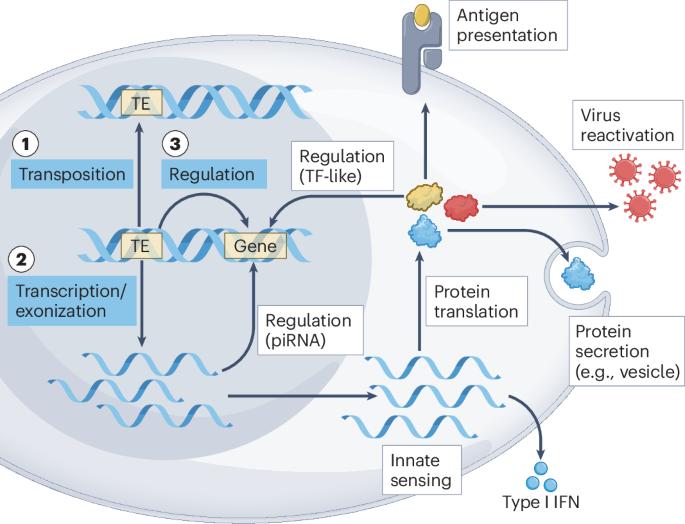转座因子作为免疫系统的指导者
IF 60.9
1区 医学
Q1 IMMUNOLOGY
引用次数: 0
摘要
转座因子(te)是通过自发整合被纳入基因组的可移动的重复核酸序列,约占人类DNA的50%。尽管今天大多数te不再是可移动的,但研究表明它们在不同的生物过程中发挥着重要作用,如衰老、胚胎发育和癌症。TEs通过多种机制影响这些过程,包括促进持续进化的te的主动转位,转座子转录产生RNA或蛋白质,以及作为增强子影响基因调控。然而,TEs如何与免疫系统相互作用仍然是一个很大程度上未被探索的领域。在这个视角中,我们描述了te如何影响免疫系统的不同方面,如先天免疫反应、T细胞激活和分化以及组织适应。此外,TEs可以作为T细胞抗肿瘤免疫新抗原的来源。我们认为TE生物学是免疫学的一个重要新兴领域,并讨论了利用TE网络治疗的潜力,例如,改善癌症、自身免疫性疾病和炎症性疾病的免疫治疗。本文章由计算机程序翻译,如有差异,请以英文原文为准。


Transposable elements as instructors of the immune system
Transposable elements (TEs) are mobile repetitive nucleic acid sequences that have been incorporated into the genome through spontaneous integration, accounting for almost 50% of human DNA. Even though most TEs are no longer mobile today, studies have demonstrated that they have important roles in different biological processes, such as ageing, embryonic development, and cancer. TEs influence these processes through various mechanisms, including active transposition of TEs contributing to ongoing evolution, transposon transcription generating RNA or protein, and by influencing gene regulation as enhancers. However, how TEs interact with the immune system remains a largely unexplored field. In this Perspective, we describe how TEs might influence different aspects of the immune system, such as innate immune responses, T cell activation and differentiation, and tissue adaptation. Furthermore, TEs can serve as a source of neoantigens for T cells in antitumour immunity. We suggest that TE biology is an important emerging field of immunology and discuss the potential to harness the TE network therapeutically, for example, to improve immunotherapies for cancer and autoimmune and inflammatory diseases. In this Perspective, Feuerer and colleagues consider how transposable elements (TEs) — which are mobile nucleic acid sequences in the genome — can impact diverse immune responses. For instance, transcription of TEs can activate innate immune pathways that generate type I interferons, TEs can regulate gene expression in immune cells and TEs could potentially be targeted to generate tumour neoantigens for immunotherapy purposes.
求助全文
通过发布文献求助,成功后即可免费获取论文全文。
去求助
来源期刊

Nature Reviews Immunology
医学-免疫学
CiteScore
93.40
自引率
0.40%
发文量
131
审稿时长
6-12 weeks
期刊介绍:
Nature Reviews Immunology is a journal that provides comprehensive coverage of all areas of immunology, including fundamental mechanisms and applied aspects. It has two international standard serial numbers (ISSN): 1474-1733 for print and 1474-1741 for online. In addition to review articles, the journal also features recent developments and new primary papers in the field, as well as reflections on influential people, papers, and events in the development of immunology. The subjects covered by Nature Reviews Immunology include allergy and asthma, autoimmunity, antigen processing and presentation, apoptosis and cell death, chemokines and chemokine receptors, cytokines and cytokine receptors, development and function of cells of the immune system, haematopoiesis, infection and immunity, immunotherapy, innate immunity, mucosal immunology and the microbiota, regulation of the immune response, signalling in the immune system, transplantation, tumour immunology and immunotherapy, and vaccine development.
 求助内容:
求助内容: 应助结果提醒方式:
应助结果提醒方式:


